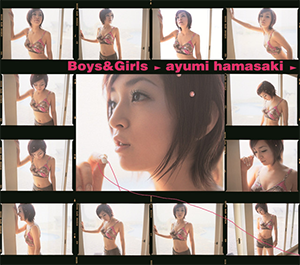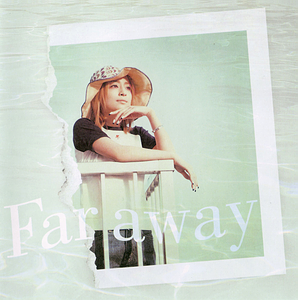
"Love (Destiny)" (stylized as "LOVE ~Destiny~") is a song recorded by Japanese recording artist Ayumi Hamasaki, serving as the second single for her second studio album, Loveppears (1999). It was released by Avex Trax in Japan and Taiwan on April 14, 1999, and through Avex Entertainment Inc. worldwide in September 2008. The track was written by Hamasaki herself, while production was handled by long-time collaborator Max Matsuura. Three versions of the recording have been made available—a ballad version arranged by Tsunku, an edited version with vocals by Tsunku, and a dance-influenced version included on Loveppears.

"To Be" is a song by Japanese recording artist Ayumi Hamasaki. It served as the third single from Hamasaki's second studio album Loveppears (1999). The track was released by Avex Trax in Japan and Taiwan on May 12, 1999, and through Avex Entertainment Inc. worldwide in September 2008. It was Hamasaki's final single to be distributed as a Mini-CD, a format that debuted at the start of her career in April 1998. "To Be" was written by Hamasaki herself, while production was handled by long-time collaborator Max Matsuura. Musically, it is a J-Pop that was written in third person perspective, much like the content from the parent album.

"Boys & Girls" is a song recorded by Japanese recording artist Ayumi Hamasaki, serving as the fourth single for her second studio album, Loveppears (1999). It was released by Avex Trax in Japan and Hong Kong on July 14, 1999, and through Avex USA in North America in early 2001, while being re-distributed in 2003. "Boys & Girls" marks Hamasaki's first single to be made available for purchase as a maxi single with additional remixes. The track was written by the singer herself, while production was handled by long-time collaborator Max Matsuura. Musically, the song is a dance recording, a genre that heavily influences Loveppears. The single's lyrical content is written in third-person perspective.

A is an extended play (EP) by Japanese recording artist Ayumi Hamasaki. It was released by Avex Trax in Japan and Hong Kong on August 11, 1999, in 10 different editions, and through Avex Entertainment Inc. worldwide in September 2008. It additionally served as a single from her second studio album Loveppears (1999), and is her first single marketed as an EP. The 12-track EP contains four new original songs: "Monochrome", "Too Late", "Trauma", and "End Roll", and eight remixes. All songs were written by Hamasaki, while production was handled by long-time collaborator Max Matsuura.

"Kanariya" is a song recorded by Japanese recording artist Ayumi Hamasaki for her second studio album, Loveppears (1999). It was released by Avex Trax in Japan and Hong Kong on December 8, 1999, and through Avex USA in North America in early 2000. The recording also served as Hamasaki's second limited edition single, with limited physical units of 300,000 copies. The track was written by Hamasaki herself, while production was handled by long-time collaborator Max Matsuura. Two versions of "Kanariya" were made available for consumption—a radio edit produced by American disc jockey Jonathan Peters, and the album version composed by Yasuhiko Hoshino. Lyrically, the song was written in third person perspective.

"Fly High" is a song recorded by Japanese recording artist Ayumi Hamasaki. It was released by Avex Trax in Japan on February 9, 2000, and through Avex Entertainment Inc. worldwide in September 2008. The recording served as Hamasaki's third and final limited edition single from her second studio album, Loveppears (1999), limiting physical units to 300,000 copies. The track was written by the singer herself, while production was handled by long-time collaborator Max Matsuura. Two versions of "Fly High" were made available for consumption—a radio edit composed by HΛL, and the album version produced by Dai Nagao. Lyrically, the song was written in third person perspective.

"Vogue" is a song recorded by Japanese recording artist Ayumi Hamasaki for her third studio album, Duty (2000). It was written by Hamasaki, while production was handled by Max Matsuura. It premiered on April 26, 2000 as the lead single from the album. Her third consecutive lead single to be produced by Matsuura, the song is part of a trilogy from Duty; the other two singles being "Far Away" and "Seasons".

"Far Away" is a song recorded by Japanese recording artist Ayumi Hamasaki for her third studio album, Duty (2000). It was written by Hamasaki, while production was handled by Max Matsuura. It premiered on May 17, 2000, as the second single from the album. The song is part of a trilogy from Duty; the other two singles being "Vogue" and "Seasons".

"Seasons" is a song by Japanese recording artist Ayumi Hamasaki for her third studio album, Duty (2000). It was written by Hamasaki, while production was handled by Max Matsuura. It premiered on June 7, 2000, as the third single from the album. The song is the final part of a trilogy from Duty; the other two singles being "Vogue" and "Far Away".

"All Night Long" is a song recorded by Japanese singer Ami Suzuki for her debut studio album, SA (1999). It was written and produced by Japanese producer and songwriter Tetsuya Komuro. The track was released following Suzuki's two collaborative efforts with Komuro. "All Night Long" premiered on November 5, 1998, as the third single from the album.

"Free Free" is a song by Japanese recording artist Ami Suzuki and producer Yasutaka Nakata, taken from her sixth studio album Dolce (2008). It was released on August 22, 2007 through Avex Trax and was distributed into three physical formats and for digital consumption. Additionally, the track appeared as a double A-side to "Super Music Maker", another recording by Suzuki and Nakata. Suzuki first started working with the producer in late 2006 after her staff at Avex noticed the singers engagement with dance-oriented music whilst performing at night clubs, and wanted to pair her with a musician that dealt with electronic dance music.

Dolce is the sixth studio album Japanese singer Ami Suzuki. Avex Trax released it in Japan on February 6, 2008, in a variety of formats. Max Matsuura executive produced Dolce, and is the second and final instalment of her "Join" series, which follows her previous album Connetta (2007). The "Join" series features a number of different producers and artists who worked together on various tracks from the album and appear as featured artists. Musically, Dolce is an upbeat dance record with house and j-pop influences.

"One" is a song recorded by Japanese recording artist Ami Suzuki for her seventh studio album, Supreme Show (2008). It was written and produced by Japanese producer and Capsule member Yasutaka Nakata. The track is Suzuki's third single with Nakata after her August 2007 single's "Free Free" and "Super Music Maker". "One" premiered on June 18, 2008, as the lead single from the album.

"Can't Stop the Disco" is a song recorded by Japanese recording artist Ami Suzuki for her seventh studio album, Supreme Show (2008). It was written and produced by Japanese producer and Capsule member Yasutaka Nakata. The track is Suzuki's third single with Nakata after her June 2008 single "One". "Can't Stop the Disco" premiered on September 24, 2008 as the second single from the album.

Supreme Show is the seventh and most recent studio album by Japanese singer Ami Suzuki. Avex Trax distributed it in CD and DVD formats on November 12, 2008. It was released ten months after her previous studio album, Dolce, and was promoted to commemorate the singer's tenth career anniversary. Yasutaka Nakata, who had previously appeared as a featured artist and produced on Dolce, handled the album in its entirety. Crafted to re-invent her sound and image, Supreme Show is an electronic album with additional dance notes, and includes tracks in English and Japanese language.

Next Level is the tenth studio album by Japanese recording artist Ayumi Hamasaki. It was released through Avex Trax on March 25, 2009 in five physical formats, and for digital consumption. The album was solely produced by Avex Trax owner Max Matsuura, whereas the album's content was written by Hamasaki herself. Additionally, it marks a return for several composers that helped construct her previous records, including Dai Nagao, CMJK, Kazuhiro Hara, HΛL, amongst others. Stylistically, Next Level is a departure from her previous albums, focusing on electronic music with elements of rock and dance.

"You Were..." is a song recorded by Japanese recording artist Ayumi Hamasaki, taken from her tenth studio album, Rock 'n' Roll Circus (2010). It was written by Hamasaki with production being done by long-time collaborator Max Matsuura. The song premiered on December 29, 2009 as the album's second a-side single with the album track, "Ballad". Four formats were released for the single; a CD format, a CD and DVD bundle, a limited edition box set, and a digital download. The first three artworks feature Hamasaki laying in snow, whilst the limited edition box set has a long-shot of Hamasaki in a dress.

"Feel the Love" is a song recorded by Japanese recording artist Ayumi Hamasaki. It was released in six different formats on December 25, 2013 by Avex Trax, Avex Taiwan, and Avex Entertainment Inc. worldwide. It was also her first physical release in three years since her EP–single L (2010), and her first double A-side single, alongside the track "Merry-Go-Round", since "Moon" and "Blossom" that same year. The track was written by the singer, whilst production was handled by Japanese musician and long-time collaborator Max Matsuura with the assistance of DJ Hello Kitty; this marks the singer's first single to be produced with another producer outside of Matsuura. Musically, "Feel the Love" is an electronic dance song that lyrically focuses on love and having a good time.

"Super Music Maker" is a song recorded by Japanese recording artist and songwriter Ami Suzuki, for her sixth studio album Dolce (2008) and a re-recorded version for her seventh album Supreme Show (2008). Featuring Japanese record producer and Capsule member Yasutaka Nakata, the song was released as the lead single and double a-side single with "Free Free" from Dolce on August 22, 2007 through Avex Trax. Nakata had written, produced and arranged both tracks and is her first single to be handled by Nakata following later singles from her album Supreme Show (2008). Backed by synthesizers and keyboards, "Free Free" incorporates a new genre called "Eropop" with influences of electronic dance, house and disco music. The lyrical interpretation was based on the theme of erotica and freedom.

"Merry-Go-Round" is a song recorded by Japanese recording artist Ayumi Hamasaki, featuring a rap section delivered by Japanese artist Verbal, for the singer's fifteenth studio album Colours (2014). It was released worldwide in six different formats on December 25, 2013 by Avex Trax, Avex Taiwan, and Avex Entertainment Inc. It was also Hamasaki's first physical release in three years since her EP–single L (2010), and her first double A-side single, alongside the track "Feel the Love", since "Moon" and "Blossom" that same year. The track was written by Hamasaki, whilst production was handled by Japanese musician and long-time collaborator Max Matsuura with the assistance of M-Flo; this marks Hamasaki's first single to be produced with another producer outside of Matsuura. Musically, "Merry-Go-Round" is an electronic dance song that includes guitars and synthesizers in its instrumentation.


















